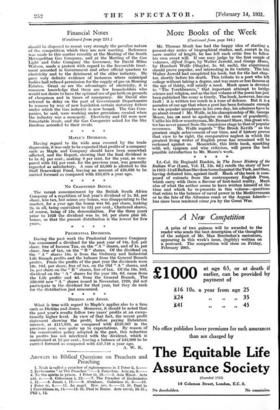More Books of the Week
(Continued from page 244.) - Mr. Thomas Moult has had the happy idea of starting a present-day series of biographical studies, and, except in the mere matter of length, he has left each critic free to follow his own sweet will. If one may judge by the first couple of volumes, Alfred Noyes, by Walter Jerrold, and George Moore, by Humbert Wolfe (Shaylor, 3s. 6d. each), the experiment should prove popular, and interesting in its variety. The late Walter Jerrold had completed his book, but for the last chap- ter, shortly before his death. This tribute to a poet who left college without taking a degree, and was more or less famous at the age of thirty, will satisfy a need. Much space is devoted to "The Torchbearers," that important attempt to bridge science and religion, and as the last volume of the poem has just been published the essay is timely. The book, however, has one fault : it is written too much in a tone of defence. But it is a paradox of our age that when a poet has been fortunate enough to win popular acceptance in his own day, his admirers have to go about armed I Mr. Wolfe, in his championship of Mr. George Moore, has no need to apologise on the score of popularity. Unlike his fellow countryman, Mr. Bernard Shaw, this great wri- ter has never passed from the suspicious stage to that of popular reverence. Mr. Wolfe regards The Brook Kerith ' as the greatest single achievement of our time, and if history proves that view to be right, the comparative neglect in which the greatest living writer of English prose has remained will be reckoned against us. Meanwhile, this little book, sparkling with wit, epigram and wise criticism, will prove the best possible introduction to Mr. Moore's work.
* * * *















































 Previous page
Previous page